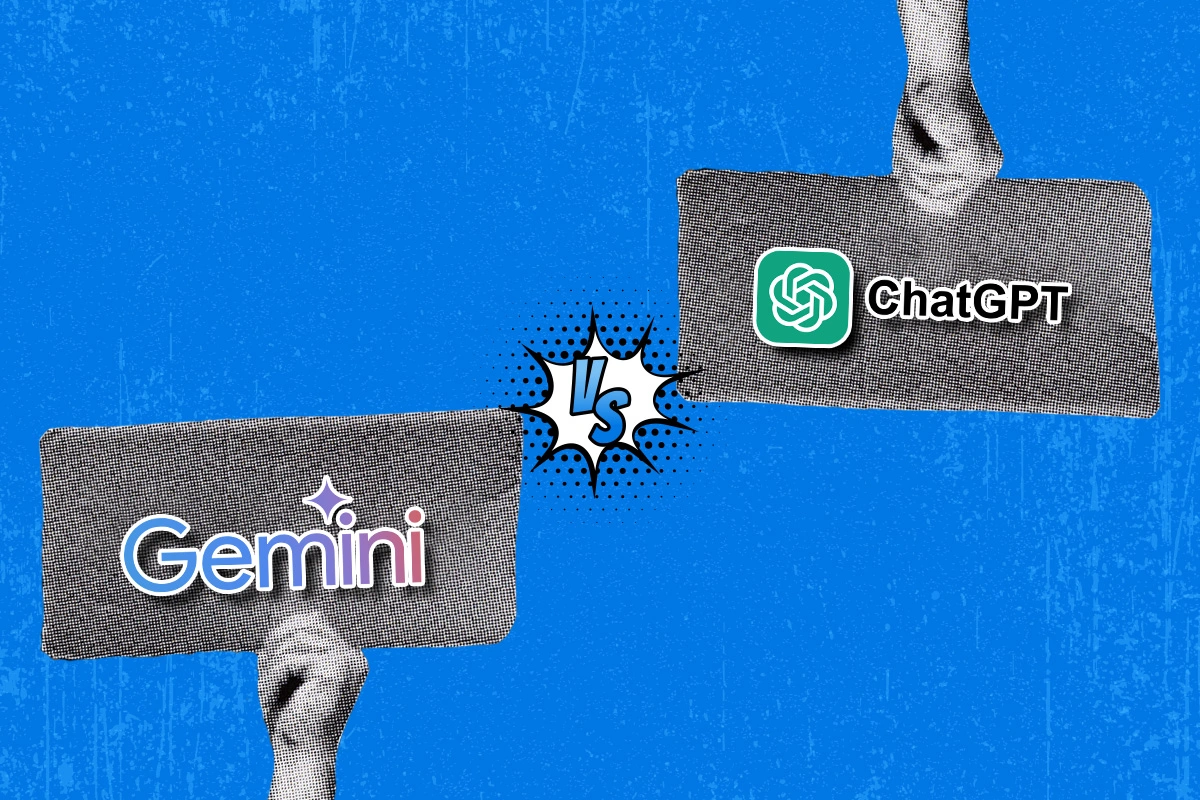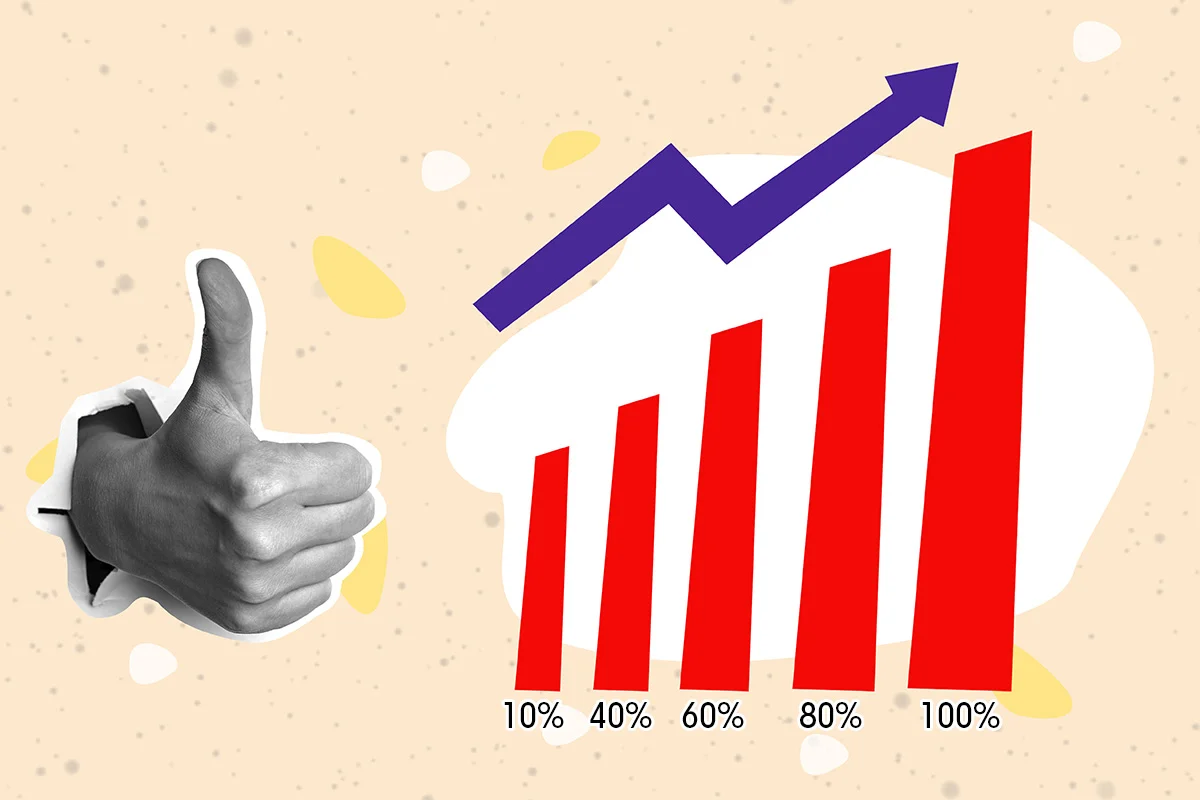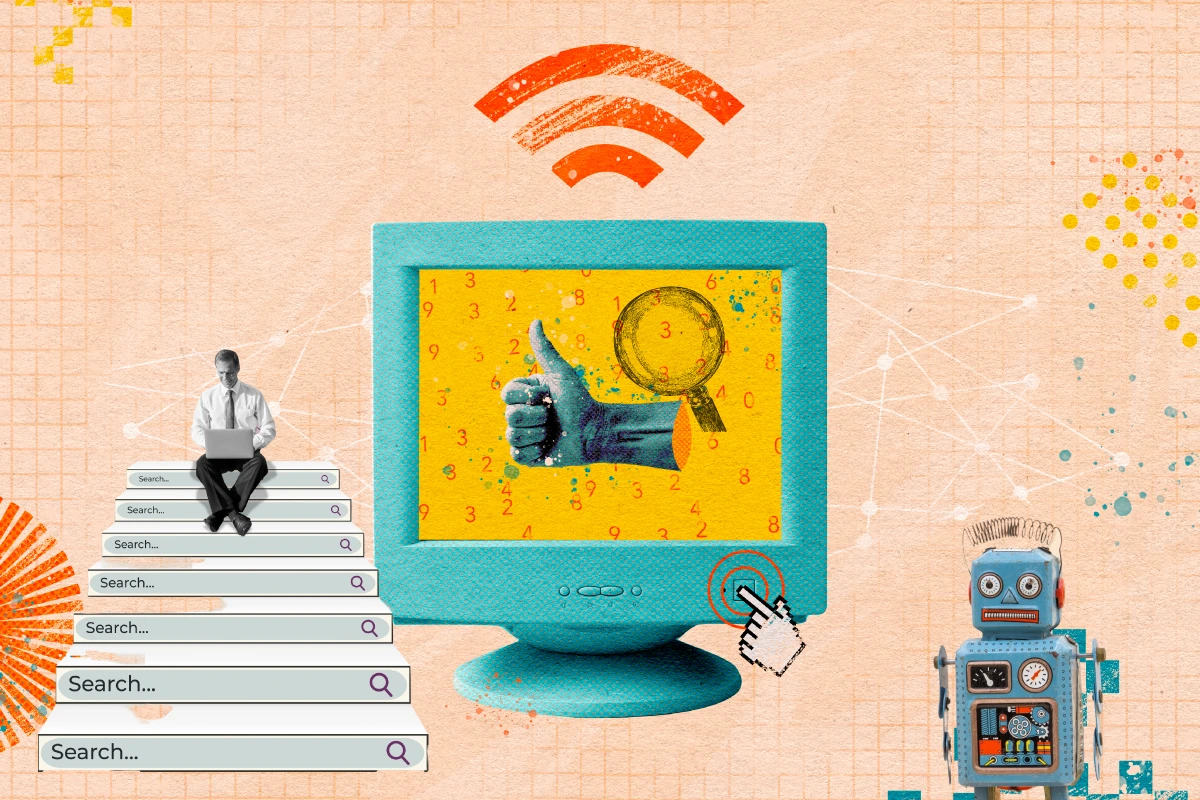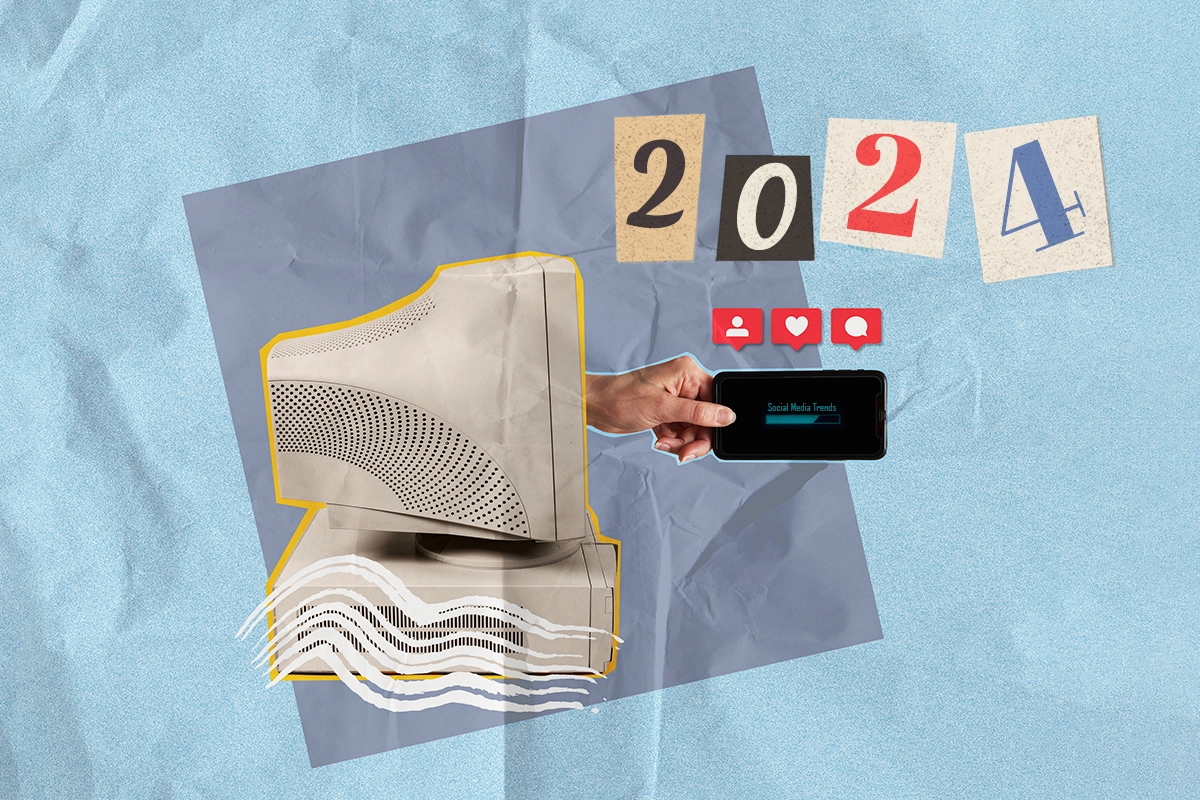We’re seeing some amazing leaps in large language models (LLMs) like ChatGPT Plus and Gemini! These models might take different paths to get there, but they’re both making a huge splash in the world of content creation using advanced AI. The future looks bright for these models, and as they get even more powerful, they could change the way we interact with technology. The world of content creators has undergone changes full of fear yet exciting at the same time. Even the developers fear the code they were preparing is already owned by advanced AI.
Let’s look at the battle brewing between these two language titans! Gemini vs. ChatGPT understanding their strengths and limitations allows us to leverage their potential effectively, paving the way for a future where technology seamlessly interacts with and complements human intelligence.
The arena of artificial intelligence (AI) has witnessed remarkable advancements in recent years, particularly within the domain of natural language processing (NLP). AI language models like Gemini and GPT (Generative Pre-trained Transformer) have emerged as frontrunners, captivating the world with their ability to generate human-quality text, translate languages, and engage in captivating dialogues. But in the face of hype, a crucial question arises: What differentiates these language titans?
Understanding the Minds of Language Titans: Google’s Bard vs. Chatgpt
Gemini vs. chatgpt is the most exciting trends in 2024, as they are capable of producing human-quality content and performing various tasks. They are the interfaces to language models, which are separate entities (which are also named Gemini and GPT), and we happen to be the lucky user ends. Gemini is a single language model while GPT refers to the spectrum of language models named after it, their iterations, ChatGPT1.0, ChatGPT2.0, ChatGPT3.0, and ChatGPT4, among which Gemini competitor’s ChatGPT3.0 has become famous for its unsurpassable results. Though they both contribute a larger part to NLPs, they have a lot of key differences.
Let’s uncover some differences between Gemini and ChatGpt:
- Gemini: Developed by Google AI, Gemini stands as a formidable contender in the LLM arena.
ChatGpt is a foundational technology developed by Open AI. - Gemini: Previously called Bard, Gemini means ‘Twins’ in Latin. Its conceptual meaning maps to the potential for versatility, duality, and the ability to multitask.
ChatGpt: Generative Pre-trained Transformer. - Gemini: Designed to process the input information and automate tasks to save users time and effort.
ChatGpt is designed to process input information and solve it conversationally. It is like speaking with an expert. - Gemini: Ability to process various digital formats like images, audio, and texts.
ChatGpt is text-based application. It is mainly for creative writing and translation. - Gemini: It has a broader capability. It is designed to have continuous real-time learning and stay up-to-date with technology and trends.
ChatGpt: It has a limited ability to learn from real-time data. It holds just the information provided during the initial training. - Gemini: It has access to research papers and publicly available content.
ChatGpt has only limited access to research papers. - Gemini: It is still under Google development and not publicly available yet.
ChatGpt is accessible through research projects or paid APIs. - Gemini: When questioned about real-time data, like the famous restaurants near me, Gemini gives the address and star rating in Google Maps. It also pulls up Google Maps and shows the locations of famous restaurants.
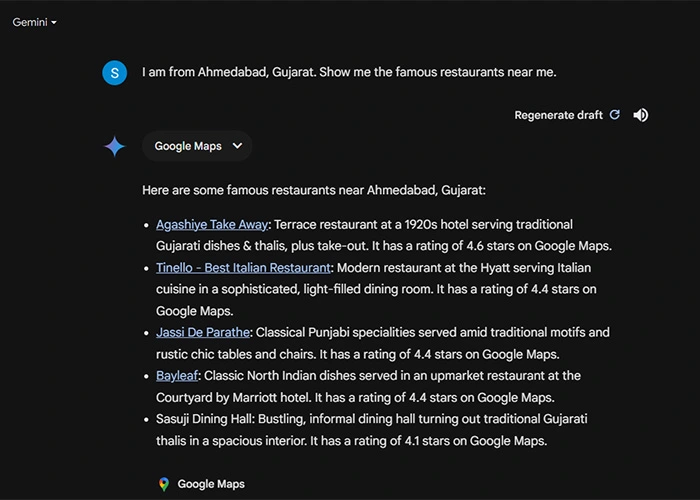
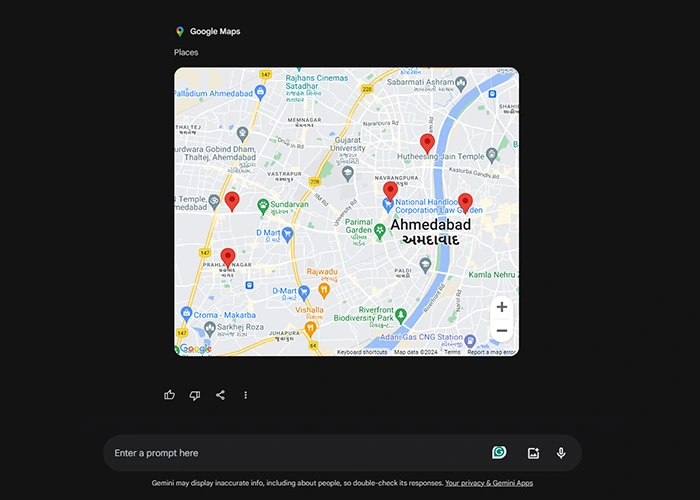
Chatgpt: When questioned about real-time data, Gemini’s alternative ChatGPT apologizes for its incapability. Instead of answering the question directly, it provides ways from which the target data can be obtained like searches in Google Maps, social media, online food delivery apps, and such.
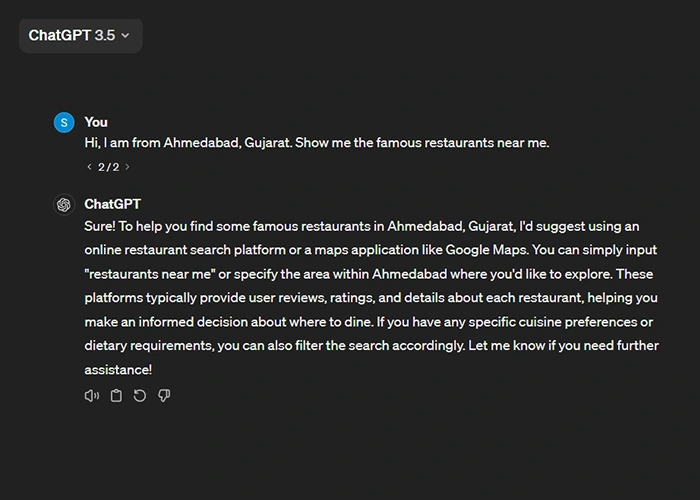
- Gemini: provides information that is Google verified.
ChatGpt: asks the user to check whether the information provided is correct. - Gemini: It takes a little longer to answer.
ChatGpt: The immediate response or response time is very less. - Gemini: Gives 3 different drafts (responses) to a single prompt.
ChatGpt Gives only one response to one prompt. - Gemini: apologizes for the inability to answer repetitive questions within the same conversation.
ChatGpt gives answers straight to the point, no matter how repetitive the prompts are. - Gemini: Prompt: Gemini vs. Chatgpt
Gives the differences in 5 categories:
- Developer
- Data source
- Capabilities
- Accessibility
- Performance
GPT: Prompt: Gemini vs. Chatgpt
Gives a brief description of itself and asks what Gemini means contextually, as Gemini means a lot more than an LLM.
- Gemini: Prompt: The Difference between Gemini and ChatGPT
Listed the differences as the previous prompt
ChatGPT: Prompt: Differences between Gemini and ChatGPT - Gemini: If any emotional prompt is given, like, I am angry at you or I love you, Gemini says it understands, though it can’t feel as if it’s an LLM. It tries to understand the user’s emotion by asking about it to make the user feel better and to self-learn in the future.
ChatGPT: If any emotional prompt is given, like, I am angry at you or I love you, ChatGPT says it is not human to feel those things and apologizes straight. And it tells if it can provide information on anything useful for the end user.
It says, “As of my last knowledge update in January 2022, there isn’t a widely recognized connection between “Gemini” and a specific technology or model comparable to GPT (Generative Pre-trained Transformer). If “Gemini” is a term related to a new development or technology that emerged after January 2022, I recommend checking the latest sources for the most up-to-date information on Gemini in the specific context you are referring to.”
Gemini is completely human-friendly, while ChatGPT is human-friendly only to a certain extent.
Now, before diving into more practical examples of them, I would like to shed some light on the AI landscape and other evolving tools catering to the specific needs of the industry. The two titans aren’t solely engaged in competition; alternatives to ChatGPT and Gemini also exist in the market. Here are some:
- Perplexity
- Groq
- Microsoft Co-pilot
- Blackbox.ai
- Claude
- Semrush Content Shake AI
Sometimes, those who are not in the limelight win the battle. So always explore the less-used tools in the same marketplace. Again, back to the language titans, let’s take a ride into practical examples to learn more.
To understand which LLM gives a better explanation, the following prompt was given:
Prompt: Explain the multiplication of numbers to me.
- Gemini: Gives three different drafts at a time. Each draft explains a different word problem for a basic understanding of multiplication and then slowly goes into an arithmetic explanation.
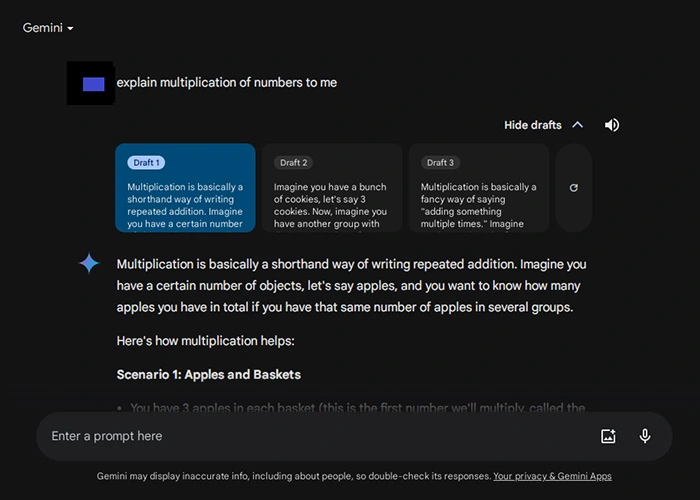
ChatGPT: Draft: Explains only with the arithmetic explanation. No basic understanding of word problems is given.
Gemini: If any website is given as a prompt, Gemini accesses the website and gives the crux of it for basic understanding. Gemini has global access to all the websites in the world.
ChatGPT: ChatGPT says it’s sorry and that it doesn’t have access to the website given as a prompt.
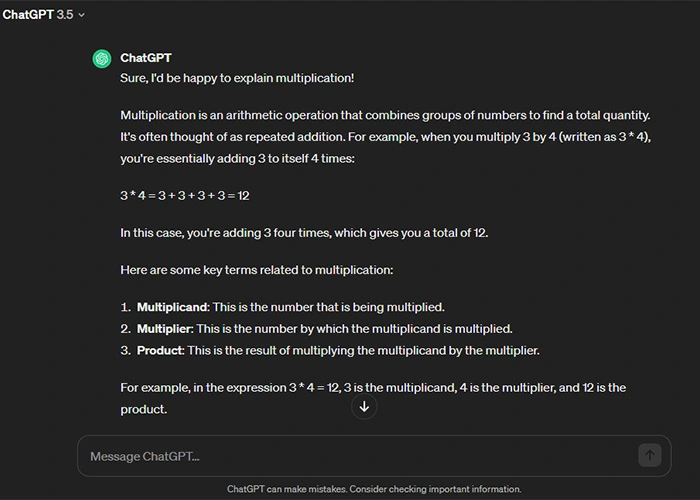
To understand which LLM produces plagiarism free and AI undetectable content and check which LLM produces content within the given word limit, the following prompt was given as input.
Prompt: What is leadership? Give me content for 100 words. Make it AI-undetectable and 100% plagiarism-free.
Results from Gemini:
Draft 1 word count: 56 words
Draft 2 word count: 71 words, but display the count as 99 words.
Draft 3 word count: 71 words. Draft 3 and Draft 2 are the same.
When regenerate drafts (a small refresh symbol near drafts) is pressed, a new draft for every draft is displayed with a varying word count.
Plagiarism: less or 0% plagiarism.
AI Free Content: close to 100%
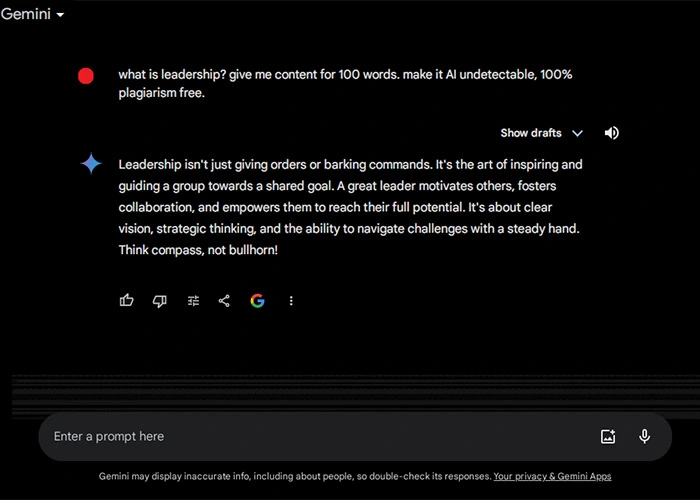
Plagiarism and AI detection report:
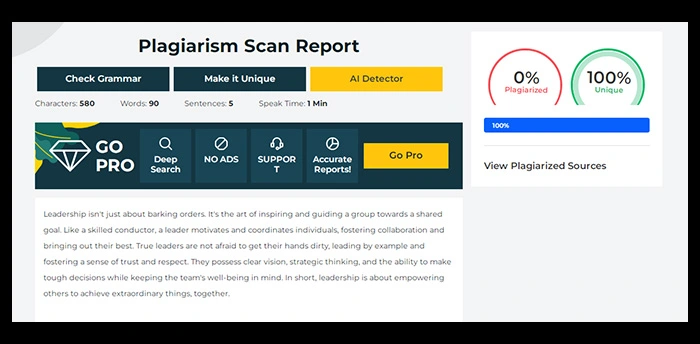
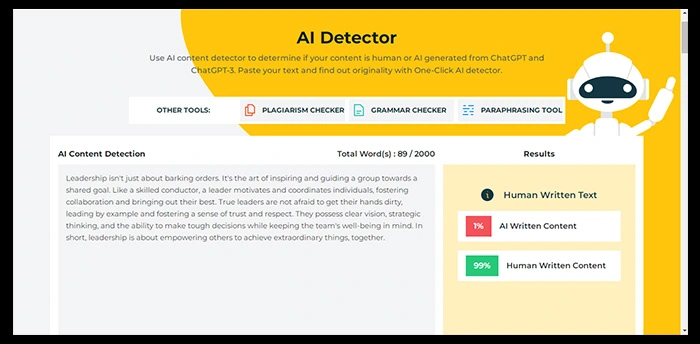
Results from ChatGPT LLM:
Draft word count: 102 words
When regenerate draft is pressed,
Draft word count: 96 words.
When regenerate draft is again pressed, the draft produced has a 100 word count.
Drafts 1 & 2 are almost similar. Draft 3 is better. Draft 4 & 5 are exactly the same. So it gives 3 different drafts when asked for regeneration 3 times.
Plagiarism: More plagiarized content comparatively.
AI detectable content: close to 80%
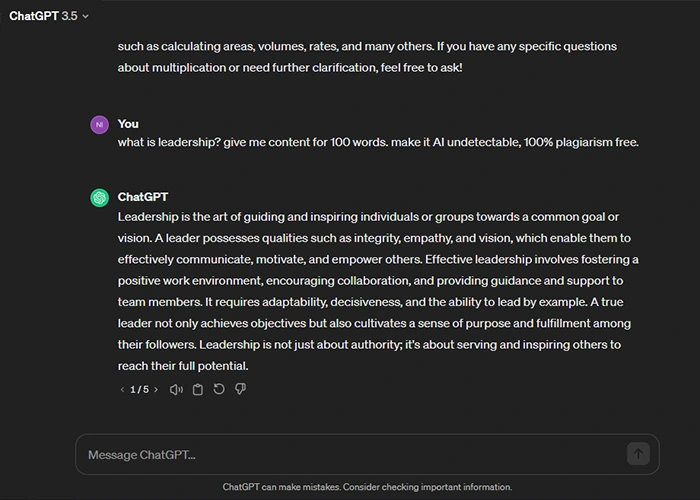
Plagiarism and AI Detection Report:
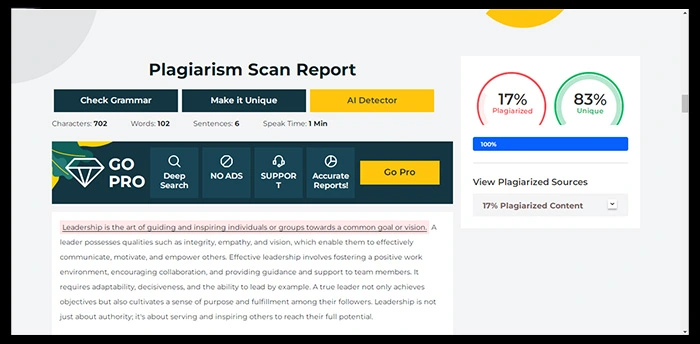
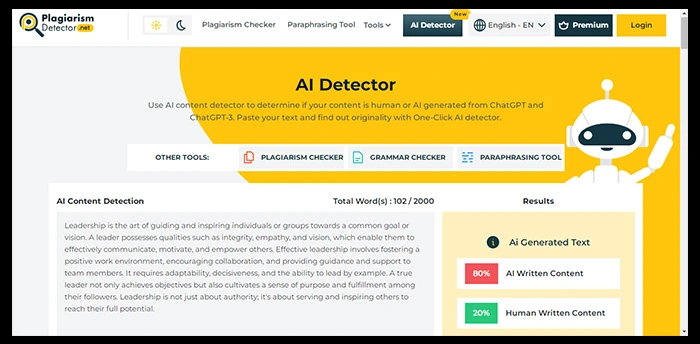
Yann LeCun, Chief AI Scientist at Meta, says,
“The future of AI is not about building human-like intelligence, but about building intelligence that complements human intelligence.”
Fei-Fei Li, Co-Director, Stanford Human-Centered AI Institute, says,
“AI is not here to replace us but to augment us. It’s here to help us tackle some of the most pressing challenges that we face as a society.”
Conclusion
The battle “Gemini vs. ChatGPT Plus” is revolutionizing the field of technology. As the future unfolds, their abilities might become more similar, leading to even more powerful and versatile language models that could be a game-changer for innovative content creators. However, for now, understanding their strengths and limitations allows us to leverage their potential effectively, paving the way for a future where technology seamlessly interacts with and complements human intelligence.

